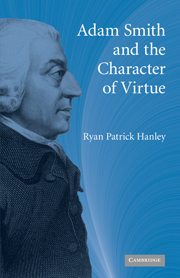Book contents
- Frontmatter
- Contents
- Preface
- Acknowledgments
- Abbreviations
- Introduction
- 1 The Problem: Commerce and Corruption
- 2 The Solution: Moral Philosophy
- 3 Interlude: The What and the How of TMS VI
- 4 Prudence, or Commercial Virtue
- 5 Magnanimity, or Classical Virtue
- 6 Beneficence, or Christian Virtue
- Epilogue: The “Economy of Greatness”
- Index
- References
1 - The Problem: Commerce and Corruption
Published online by Cambridge University Press: 06 November 2009
- Frontmatter
- Contents
- Preface
- Acknowledgments
- Abbreviations
- Introduction
- 1 The Problem: Commerce and Corruption
- 2 The Solution: Moral Philosophy
- 3 Interlude: The What and the How of TMS VI
- 4 Prudence, or Commercial Virtue
- 5 Magnanimity, or Classical Virtue
- 6 Beneficence, or Christian Virtue
- Epilogue: The “Economy of Greatness”
- Index
- References
Summary
SMITH'S DEFENSE OF COMMERCIAL SOCIETY
The following study focuses on Smith's understanding of the ills of commercial society and the response to these ills he set forth in order to maximize commercial society's benefits. Yet the very fact that Smith spent such effort on this problem suggests the depth of two convictions on his part (and perhaps suspicions on ours): first, that commercial society is too entrenched to be readily removed and replaced; and second, that commercial society, for all its possible shortcomings, remains very much worth saving given the magnitude of its benefits. So as not to lose sight of his steadfast and indeed unambivalent dedication to commercial society we would thus do well to begin by restating the specific benefits that prompted such dedication from Smith. They are two: first, commercial society's relief of poverty through the increases it makes possible in the material welfare of all; and second, commercial society's promotion of freedom by substituting interdependence for the direct dependence characteristic of social relations in earlier political and economic orders.
With respect to the first point, an ever-growing consensus has emerged among recent scholars that Smith was dedicated to the alleviation of poverty. I want to restate and extend this claim by calling particular attention to a less-emphasized but central element of this concern: namely, the confluence of Smith's emphasis on the vulgarity of the selfishness of the rich and his emphasis on its material benefits for the innocent poor.
Information
- Type
- Chapter
- Information
- Adam Smith and the Character of Virtue , pp. 15 - 52Publisher: Cambridge University PressPrint publication year: 2009
